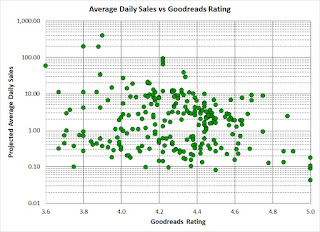Every indie author has probably been told that reviews drive book sales. That adding reviews to an Amazon title will prompt prospective buyers to purchase that title, and how Amazon's secret algorithm for where books place among their recommended products takes reviews into account.
I was therefore eager to see if I could find evidence for this trend in the individual book and author sales data which I collected from my one-day snapshot. Information was collected on the number of ratings, number of reviews, and ratings score for each title from both Amazon and Goodreads.
In general, there does appear to be an overall trend between the number of book ratings and book sales - but it's impossible to determine how much the ratings are driving sales and how much they are a product of those sales. The trend between book reviews and book sales was very similar, and there was little meaningful difference in this trend between Amazon and Goodreads - although there were usually more ratings and reviews for each book on Goodreads than on Amazon.
The relationship between the number of ratings and book sales becomes more revealing, however, when plotted as a frequency - taking into account the average number of days between the release of each review. There is a sharp shift in the slope of this trend for books which receive ratings more frequently than once every 15 days.
These trends, however, appear to be driven more by the popularity of the book than they are by the ability of additional reviews and ratings to generate more sales. There is no sharp shift in the sales potential when the book reaches ten reviews, or twenty, or any other arbitrary break-point.
This does not mean that reviews are unimportant. There are many promotional services, for example, which will not accept a book for consideration until it has exceeded some minimum number of reviews - often around ten. And there may very well be an element in Amazon's search algorithm which takes the quantity of reviews into account. But these effects are less pronounced than other influences might be on a book's success - such as the number of books which the author has in their portfolio, or the advertising strategy of the individual author. There is general agreement that reviews are an important component to an author's success. But they are not the only element, and they do not guarantee a novel's performance.
Similarly, there is no clear correlation between the rating of a book, on either Amazon or Goodreads, and the ability of that title to generate sales. Among the books examined, all of which had a rating of greater than 3.6, each book's rating appeared to have minimal effect on whether readers would be willing to purchase that title. In fact, the highest-grossing titles tended to have a slightly lower rating, a reflection of the broader audience which had reviewed and rated each book. As expected, the Goodreads rating was usually (although not always) lower than the Amazon rating. But the rating score still does not directly correlate with sales.
To understand why some books are more successful than others, we will have to look at other contributors.





No comments:
Post a Comment